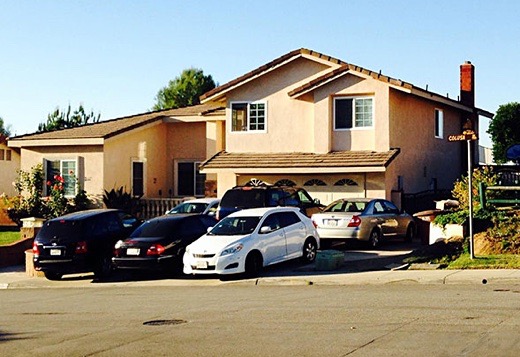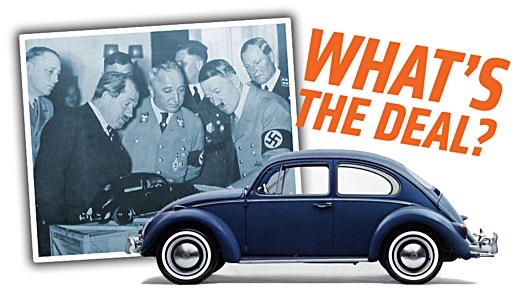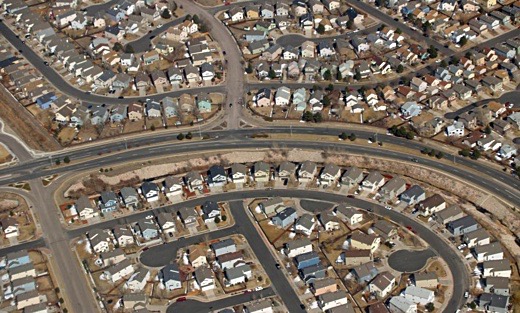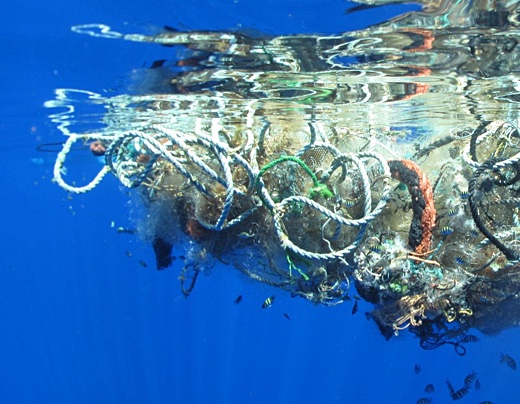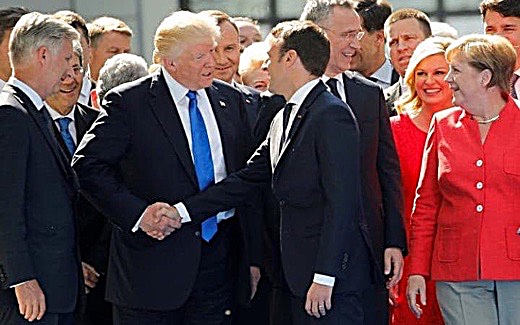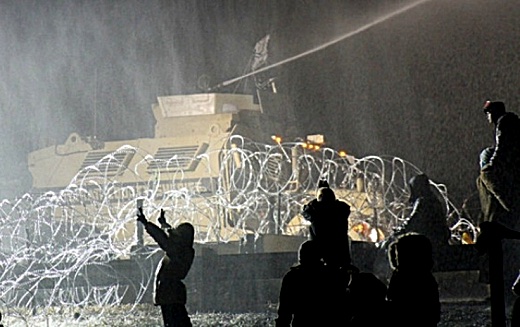SUBHEAD: An 8-year old child in Manchester, just like one in Mosul or Aleppo, is innocent.
By Raul Ilargi Meijer on 27 May 2017 for the Automatic Earth -
(
https://www.theautomaticearth.com/2017/05/manchester-or-innocence-long-lost/)
 Image above: Mass media propaganda demonizes children in Iran to exhort more violence against our "enemeies". It's all lies. Stop the violence against the Middle East and Islam. It's our kuleana. From (https://themediaexpress.com/2017/03/11/military-training-camps-for-iranian-children-to-prepare-for-jihad/).
Image above: Mass media propaganda demonizes children in Iran to exhort more violence against our "enemeies". It's all lies. Stop the violence against the Middle East and Islam. It's our kuleana. From (https://themediaexpress.com/2017/03/11/military-training-camps-for-iranian-children-to-prepare-for-jihad/).
[IB Publisher's note: This is a long and detailed piece... certainely longer than most we post on IslandBreath. Raul Ilargi Meijer hits the nail on the head by implicating Western culture with complicity in the atrocity of the endless War on Terrorism.]
There are times when you have to talk about things when it appears most inopportune to do so, because they’re the only times people might listen. Times when people will argue that ‘this is not the right moment’, while in reality it’s the only moment.
A solid 99% of people will have been filled, and rightly so of course, with a mixture of disgust, disbelief and infinite sadness when hearing of yet another attack on civilians in Europe, this one in Manchester. An equally solid 99% will have failed to recognize that while the event was unique for the city of Manchester, it was by no means unique for the world, not even at the time it happened.
Though the footage of parents desperately trying to find their children, and the news that one of the dead was just 8 years old, touches everyone in more or less the same place in our hearts, by far most of us miss out on the next logical step.
In a wider perspective, it is easy to see that parents crying for missing children, and children killed in infancy, is what connects Manchester, and the UK, and Europe, to parents in Syria, Libya, Iraq.
What’s different between these places is not the suffering or the outrage, the mourning or the despair, what’s different is only the location on the map. That and the frequency with which terror is unleashed upon a given population. But just because it happens all the time in other places doesn’t make it more normal or acceptable.
It’s the exact same thing, the exact same experience, and still a vast majority of people don’t, choose not to, feel it as such.
Which is curious when you think about it. In the aftermath of a terror attack, the mother of a missing, maimed or murdered child undergoes the same heartbreak no matter where they are in the world (“I hope the Russians love their children too”). But the empathy, the compassion, is hardly acknowledged in Britain at all, let alone shared.
Not that it couldn’t be. Imagine that our papers and TV channels would tell us, preferably repeatedly, in their reports in the wake of an attack like the one in Manchester how eerily similar the emotions must be to those felt in Aleppo, Homs and many other cities.
That would change our perception enormously. But the media choose not to make the connection, and the people apparently are not capable of doing it themselves.
None of that changes the fact, however, that British lives are not more valuable than Syrian and Libyan ones. Not even when we’ve gotten used to ‘news’ about bombings and drone attacks executed for years now by US-led coalitions, or the images of children drowning when they flee the area because of these attacks.
The overall theme here is that 99.9% of people everywhere in the world are innocent, especially when they are children, but their governments and their societies are not. That doesn’t justify the Manchester attack in any shape or form, it simply lays equal blame and condemnation for western terror attacks in the Middle East and North Africa, perpetrated by the people we elect into power.
This is something people in the west pay no attention to. It’s easier that way, and besides our media with great enthusiasm pave the way for our collective ignorance, by calling some other group of people ‘terrorists’, which while they’re at it is supposed to justify killing some other mother’s child.
There’s another thing that is also different: they didn’t start. We did. The British and French terrorized the region for many decades, since the 19th century, even way before the Americans joined in.
The presence of oil, and its rising role in our economies, caused them to double down on that terror.
Yes, it’s awkward to talk about this on the eve of a deadly attack, and it’s easy to find arguments and rhetoric that appear to deflect responsibility. But at the same time this truly is the only moment we can hope that anyone will listen. And lest we forget, the UK carries an outsized share of the responsibility in this tragedy, both historically and in the present.
You can say things about the city coming together, or the country coming together, or “not allowing terrorists to affect our way of life”, but perhaps it should instead really be all the mothers who have children missing or dying, wherever they live, coming together. They all see their ways of life affected, and many on a daily basis.
Those mothers in Syria and Libya, who have been through the same hellhole as those in Manchester, are a lot closer to you than the politicians who send out jet fighters to bomb cities in the desert, or sell arms to individuals and organizations to control these cities for their own narrow personal gain, such as the governments of Saudi Arabia and Turkey.
The traumatized mothers in the desert are not your enemies; your enemies are much closer to home. Still, most of you will tend to react to fear and panic by looking for protection in exactly those circles that are least likely to provide it.
The UK government under Theresa May, like those of Tony Blair, Gordon Brown and David Cameron before, is as cynically eager as their predecessors to send bombers into the desert, and sell arms to those living there.
We can illustrate all this with a few bits of news. First, the US-led coalotion, of which the UK is a substantial part, killed more civilians in Syria than at any time since they started bombing the country almost 3 years ago.
They keep saying they don’t target civilians, but to put it mildly they don’t appear to go out of their way not to hit them. For instance, a single attack on Mosul, Iraq in March killed over 105 civilians. ‘Collateral damage’ in these cases, and there are hundreds by now, is a very disrespectful term. Moreover, the files released by Chelsea Manning show US soldiers killing people ‘with impunity’.
US-led air strikes on Syria killed a total of 225 civilians over the past month, a monitor said on Tuesday, the highest 30-day toll since the campaign began in 2014. The Syrian Observatory for Human Rights said the civilian dead between April 23 and May 23 included 44 children and 36 women. The US-led air campaign against the Islamic State jihadist group in Syria began on September 23, 2014. “The past month of operations is the highest civilian toll since the coalition began bombing Syria,” Observatory head Rami Abdel Rahman told AFP. “There has been a very big escalation.” The previous deadliest 30-day period was between February 23 and March 23 this year, when 220 civilians were killed, Abdel Rahman said.
And it’s not as if the British didn’t or couldn’t know what was going on. That was clear as early as 2003, when Tony Blair couldn’t wait to join the Bush coalition to invade Iraq on the false premise of weapons of mass destruction. Before Libya was invaded, which led to Hillary’s disgusting ‘we came we saw he died’, Gaddafi, the one who did die, warned Blair about what would happen. It indeed did, which makes Blair a guilty man.
Muammar Gaddafi warned Tony Blair in two fraught phone conversations in 2011 that his removal from the Libyan leadership would open a space for al-Qaida to seize control of the country and even launch an invasion of Europe. The transcripts of the conversations have been published with Blair’s agreement by the UK foreign affairs select committee, which is conducting an inquiry into the western air campaign that led to the ousting and killing of Gaddafi in October 2011. In the two calls the former British prime minister pleaded with Gaddafi to stand aside or end the violence. The transcripts reveal the gulf in understanding between Gaddafi and the west over what was occurring in his country and the nature of the threat he was facing.
In the first call, at 11.15am on 25 February 2011, Gaddafi gave a warning in part borne out by future events: “They [jihadis] want to control the Mediterranean and then they will attack Europe.” In the second call, at 3.25pm the same day, the Libyan leader said: “We are not fighting them, they are attacking us. I want to tell you the truth. It is not a difficult situation at all. The story is simply this: an organisation has laid down sleeping cells in north Africa. Called the al-Qaida organisation in north Africa … The sleeping cells in Libya are similar to dormant cells in America before 9/11.”
Gaddafi added: “I will have to arm the people and get ready for a fight. Libyan people will die, damage will be on the Med, Europe and the whole world. These armed groups are using the situation [in Libya] as a justification – and we shall fight them.” Three weeks after the calls, a Nato-led coalition that included Britain began bombing raids that led to the overthrow of Gaddafi. He was finally deposed in August and murdered by opponents of his regime in October.
What they are guilty of is no more and no less than Manchester. No hyperbole, but a warning from Blair’s own intelligence services back in 2003. The real weapons of mass destruction were not in Iraq, but in the White House and Downing Street no. 10. The CIA issued warnings similar to this.
Before the 2003 invasion of Iraq led by the U.S. and U.K., he was forcefully and repeatedly warned by Britain’s intelligence services that it would lead to exactly this type of terrorist attack — and he concealed these warnings from the British people, instead claiming the war would reduce the risk of terrorism. We know this because of the Chilcot Report, the seven-year-long British investigation of the Iraq War released in 2016. The report declassifies numerous internal government documents that illustrate the yawning chasm between what Blair was being told in private and his claims in public as he pushed for war.
On February 10, 2003, one month before the war began, the U.K.’s Joint Intelligence Committee — the key advisory body for the British Prime Minister on intelligence matters — issued a white paper titled “International Terrorism: War With Iraq.” It began:
“The threat from Al Qaida will increase at the onset of any military action against Iraq. They will target Coalition forces and other Western interests in the Middle East. Attacks against Western interests elsewhere are also likely, especially in the US and UK, for maximum impact. The worldwide threat from other Islamist terrorist groups and individuals will increase significantly.”
And it concluded much the same way: “Al Qaida and associated groups will continue to represent by far the greatest terrorist threat to Western interests, and that threat will be heightened by military action against Iraq. The broader threat from Islamist terrorists will also increase in the event of war, reflecting intensified anti-US/anti-Western sentiment in the Muslim world, including among Muslim communities in the West.”
Not long behind Blair came David Cameron, a man after Tony’s heart:
European ministers have embarrassed David Cameron by voting to impose an arms embargo on Saudi Arabia on the same day the British prime minister praised the UK for selling “brilliant” arms to the country. Speaking at a BAE Systems factory in Preston, the prime minister said the UK had pushed the sale of Eurofighter Typhoons to countries in the Middle East, including Oman and Saudi Arabia. [..] Cameron’s speech in Preston came at the same time the European Parliament voted to impose an EU-wide ban on arms exports to Saudi Arabia, citing criticism from the UN of its bombing in Yemen.
Asked at the talks how he was helping to export the planes, Cameron said: “With the Typhoon there is an alliance of countries: the Italians, Germans and ourselves. We spend a lot of time trying to work out who is best placed to win these export orders. We’ve got hopefully good news coming from Kuwait. The Italians have been doing a lot of work there. The British have been working very hard in Oman.” The vote will not force EU members to comply with the ban, but will force the government to examine its relationship with Saudi Arabia.
In the last year the British government has sold £3 billion (US$4.18 billion) worth of arms and military kit to the Gulf state, as well as providing training to Saudi forces. A report released by Amnesty International on Friday called the ongoing trade with Saudi Arabia “truly sickening,” and urged governments to attend meetings in Geneva on Monday to discuss the implementation of the Arms Trade Treaty (ATT). The report names the UK, France, Germany, Italy, Montenegro, the Netherlands, Spain, Sweden, Switzerland, Turkey and the US as having issued licenses for arms to Saudi Arabia worth more than £18 billion in 2015.
The arms sold include drones, bombs, torpedoes, rockets and missiles, which have been used by Saudi Arabia and its allies for gross violations of human rights and possible war crimes during aerial and ground attacks in Yemen, the campaign group said. Control Arms Director Anna Macdonald said: “Governments such as the UK and France were leaders in seeking to secure an ATT – and now they are undermining the commitments they made to reduce human suffering by supplying Saudi Arabia with some of the deadliest weapons in the world. It’s truly sickening.”
British MPs from Cameron’s own party didn’t like it either, but what meaning does that have if it takes 5 years to issue a report, and moreover he can simply refuse to give evidence?
David Cameron’s intervention in Libya was carried out with no proper intelligence analysis, drifted into an unannounced goal of regime change and shirked its moral responsibility to help reconstruct the country following the fall of Muammar Gaddafi, according to a scathing report by the foreign affairs select committee. The failures led to the country becoming a failed a state on the verge of all-out civil war, the report adds. The report, the product of a parliamentary equivalent of the Chilcot inquiry into the Iraq war, closely echoes the criticisms widely made of Tony Blair’s intervention in Iraq, and may yet come to be as damaging to Cameron’s foreign policy legacy.
It concurs with Barack Obama’s assessment that the intervention was “a shitshow”, and repeats the US president’s claim that France and Britain lost interest in Libya after Gaddafi was overthrown. Cameron has refused to give evidence to the select committee. In one of his few reflections on his major military intervention, he blamed the Libyan people for failing to take their chance of democracy.
The committee, which has a majority of Conservative members, did not have Chilcot-style access to internal papers, but took voluminous evidence from senior ministers at the time, and other key players such as Blair, the chief of the defence staff, Lord Richards, and leading diplomats. The result of the French, British and US intervention, the report finds, “was political and economic collapse, inter-militia and inter-tribal warfare, humanitarian and migrant crises, widespread human rights violations, the spread of Gaddafi regime weapons across the region and the growth of Isil [Islamic State] in north Africa”.
It seems obvious that if there were an impartial international body with the power to prosecute, Bush, Cheney, Blair, Cameron, Hillary etc. etc. (don’t forget France) would be charged with war crimes. And Obama too: his ‘shitshow’ comment must be seen in light of the ‘we came we saw he died’ comment by Hillary Clinton, his Secretary of State. Think he didn’t know what was happening?
Another person who should be charged is Theresa May, Cameron’s Home Secretary from May 2010 till July 2016, and of course Britain’s present PM, who sells as much weaponry to Saudi Arabia as she possibly can while the Saudi’s are shoving the few Yemeni’s they leave alive back beyond the Stone Age. And then May has the gall to talk about humanitarian aid.
Theresa May has defended her trip to Saudi Arabia, saying its ties with the UK are important for security and prosperity. The prime minister is facing questions about the UK’s support for the Saudi-led coalition which is fighting rebels in neighbouring Yemen. Labour Party leader Jeremy Corbyn said UK-made weapons were contributing to a “humanitarian catastrophe”. [..] Mrs May said humanitarian aid was one of the issues she would be discussing on her trip. “We are concerned about the humanitarian situation – that’s why the UK last year was the fourth largest donor to the Yemen in terms of humanitarian aid – £103m. We will be continuing with that,” she told the BBC.
[..] Mr Corbyn called for the immediate suspension of UK arms exports to Saudi Arabia. He criticised the “dictatorial Saudi monarchy’s shocking human rights record” and said the PM should focus on human rights and international law at the centre of her talks. “The Saudi-led coalition bombing in Yemen, backed by the British government, has left thousands dead, 21 million people in need of humanitarian assistance and three million refugees uprooted from their homes,” he said. “Yemen urgently needs a ceasefire, a political settlement, and food aid, not more bombing.
“British-made weapons are being used in a war which has caused a humanitarian catastrophe.”
The one person who would probably not be in front of such a court is Jeremy Corbyn, opponent of May’s in the June 8 elections. Though there is the issue that he never protested in much stronger terms as an MP. Still, if you have to pick one of the two, what is not obvious?
Theresa May has staunchly defended selling arms to Saudi Arabia despite the country facing accusations of war crimes, insisting close ties “keep people on the streets of Britain safe”. Jeremy Corbyn called on the Prime Minister to halt those sales because of the “humanitarian devastation” caused by a Saudi-led coalition waging war against rebels in Yemen. The Labour leader spoke out after the Parliamentary committee charged with scrutinising arms exports said it was likely that British weapons had been used to violate international law.
The Saudis stand accused of bombing multiple international hospitals run by the charity Médecins Sans Frontières, as well as schools, wedding parties and food factories. In the Commons, Mr Corbyn linked weapons sales to the ongoing refugee crisis, which he said should be Britain’s “number one concern and our number one humanitarian response”.
He added: “That is why I remain concerned that at the heart of this Government’s security strategy is apparently increased arms exports to the very part of the world that most immediately threatens our security.
The British Government continue to sell arms to Saudi Arabia that are being used to commit crimes against humanity in Yemen , as has been clearly detailed by the UN and other independent agencies.”
But, in response, Ms May pointed out she had called on Saudi Arabia to investigate the allegations about Yemen when she met with the kingdom’s deputy crown prince at the recent G20 summit in China. The Prime Minister dismissed Mr Corbyn’s suggestion that “what happened in Saudi Arabia was a threat to the safety of people here in the UK”. Instead, she said: “Actually, what matters is the strength of our relationship with Saudi Arabia. When it comes to counter-terrorism and dealing with terrorism, it is that relationship that has helped to keep people on the streets of Britain safe.”
May’s, and Britain’s, utterly mad stance in this is perhaps best exemplified, in one sentence, by her comments during the speedy trip she made to Turkey, again to sell more arms to an at best highly questionable regime. Why do it, why drag your entire nation through the moral gutter for $100 million or a few billion? The military industrial complex.
Theresa May issued a stern warning to Turkish president Recep Tayyip Erdogan about respecting human rights yesterday as she prepared to sign a £100m fighter jet deal that Downing Street hopes will lead to Britain becoming Turkey’s main defence partner.
And once again, no, none of this justifies the Manchester bombing. Neither a government nor an extremist movement has any right to kill innocent people. But let’s make sure we know that neither does.
There’s another aspect to the story. MI6 had close links to the Libyan community in Manchester.
The British government operated an “open door” policy that allowed Libyan exiles and British-Libyan citizens to join the 2011 uprising that toppled Muammar Gaddafi even though some had been subject to counter-terrorism control orders, Middle East Eye can reveal. Several former rebel fighters now back in the UK told MEE that they had been able to travel to Libya with “no questions asked” as authorities continued to investigate the background of a British-Libyan suicide bomber who killed 22 people in Monday’s attack in Manchester.
Salman Abedi, 22, the British-born son of exiled dissidents who returned to Libya as the revolution against Gaddafi gathered momentum, is also understood to have spent time in the North African country in 2011 and to have returned there on several subsequent occasions. Sources spoken to by MEE suggest that the government facilitated the travel of Libyan exiles and British-Libyan residents and citizens keen to fight against Gaddafi including some who it deemed to pose a potential security threat.
One British citizen with a Libyan background who was placed on a control order – effectively house arrest – because of fears that he would join militant groups in Iraq said he was “shocked” that he was able to travel to Libya in 2011 shortly after his control order was lifted. “I was allowed to go, no questions asked,” said the source. He said he had met several other British-Libyans in London who also had control orders lifted in 2011 as the war against Gaddafi intensified, with the UK, France and the US carrying out air strikes and deploying special forces soldiers in support of the rebels.
“They didn’t have passports, they were looking for fakes or a way to smuggle themselves across,” said the source. But within days of their control orders being lifted, British authorities returned their passports, he said. Many Libyan exiles in the UK with links to the LIFG [Libyan Islamic Fighting Group ] were placed on control orders and subjected to surveillance and monitoring following the rapprochement between the British and Libyan governments sealed by the so-called “Deal in the Desert” between then-British Prime Minister Tony Blair and Gaddafi in 2004.
According to documents retrieved from the ransacked offices of the Libyan intelligence agency following Gaddafi’s fall from power in 2011, British security services cracked down on Libyan dissidents in the UK as part of the deal, as well as assisting in the rendition of two senior LIFG leaders, Abdel Hakim Belhaj and Sami al-Saadi, to Tripoli where they allege they were tortured.
Torture one day, passports the other. Lovely. And it still gets better: MI6 didn’t just have close contacts with Libyans in Manchester, it knew the alleged perpetrator’s family, and used his father multiple times as on operative:
According to Scotland Yard, the attack on the crowd leaving the Ariana Grande concert at Manchester Arena, 22 May, has been perpetrated by Salman Abedi. A bankcard has been conveniently found in the pocket of the mutilated corpse of the ‘terrorist’. This attack is generally interpreted as proof that the United Kingdom is not implicated in international terrorism and that, on the contrary, it is a victim of it.
[..] In 1992, Ramadan Abedi [Salman’s father] was sent back to Libya by Britain’s MI6 and was involved in a British-devised plot to assassinate Muammar Gaddafi. The operation having been readily exposed, he was exfiltrated by MI6 and transferred back to the UK where he obtained political asylum.
He moved in 1999 to Whalley Range (south of Manchester) where there was already resident a small Libyan Islamist community. In 1994, Ramadan Abedi returned again to Libya under MI6’s direction. In late 1995 he is involved in the creation of the Libyan Islamic Fighting Group (LIFG), a local branch of Al-Qaeda, in conjunction with Abdelhakim Belhadj.
The LIFG was then employed by MI6 again to assassinate Gaddafi, for a payoff of £100,000. This operation, which also failed, provoked heated exchanges within British Intelligence, leading to the resignation of one David Shayler. Other former members of the LIFG have also lived at Whalley Range, including Abedi’s friend Abd al-Baset-Azzouz. In 2009, this last joined Al-Qaeda in Pakistan and became a close associate of its chief, Ayman al-Zawahiri. In 2011, al-Baset-Azzouz is active on the ground with the NATO operation against Libya.
On 11 September 2012, he directs the operation against the US Ambassador in Libya, Christopher Stevens, assassinated at Benghazi. He is arrested in Turkey and extradited to the US in December 2014, his trial still pending. Nobody pays attention to the fact that Ramadan Abedi has linked LIFG members to the formation of Al-Qaeda in Iraq and, in 2011, he takes part in MI6’s ‘Arab Spring’ operations, and in LIFG’s role on the ground in support of NATO. In any event, Abedi returned to Libya after the fall of Gaddafi and moves his family there, leaving his older children in the family home at Whalley Range.
According to the former Spanish Prime Minister José Maria Aznar, Abdelhakim Belhadj was involved in the assassinations in Madrid of 11 March 2004. Later, he is secretly arrested in Malaysia by the CIA and transferred to Libya where he is tortured not by Libyan or American functionaries but by MI6 agents. He is finally freed after the accord between Saif al-Islam Gaddafi [Gaddafi’s son] and the jihadists.
Luckily, perhaps the Brits are not that stupid:
Slightly over a half of people in the UK agree that the nation’s involvement in wars abroad has increased the terror threat to the country, a poll out Friday has showed. The survey found that 53% of 7,134 UK adults sampled by YouGov said they believed wars the UK supported or fought were in part responsible for terror attacks at home. [..]
Labour leader Jeremy Corbyn, who made a speech earlier in the day to mark his return to general election campaigning, said UK’s war on terror had not worked. He cited intelligence experts who said foreign wars, including in Libya, threatened the country’s security.
If that is true, Theresa May obviously should have no chance of winning. May can and will try to use the horror of Manchester, and the subsequent pause in the campaign, to strengthen her position in the upcoming election, by playing on people’s fear and making them believe she’s in control.
Even if the very attack itself makes clear that she’s not. The Tories have already attacked Corbyn for saying their policies have failed; it was the wrong time to say that, according to them.
But it’s not. It’s the very best time. This is when people pay attention. And having this discussion doesn’t disrespect the victims of Manchester. If anything, it shows more respect than not having the discussion. Because you want to make sure this doesn’t happen again, neither here nor there. And to achieve that, you have to look at why these things happen.
An 8-year old child in Manchester, just like one in Mosul or Aleppo, is innocent. Yourself, perhaps not so much. The politicians you vote into power, and the media you read and watch to inform you, not a chance. Guilty as hell.
.

